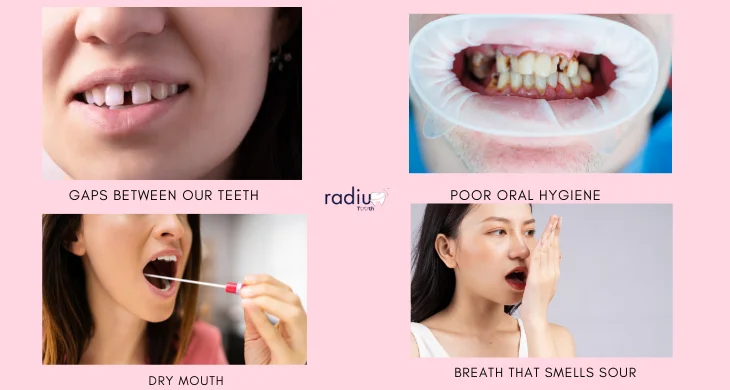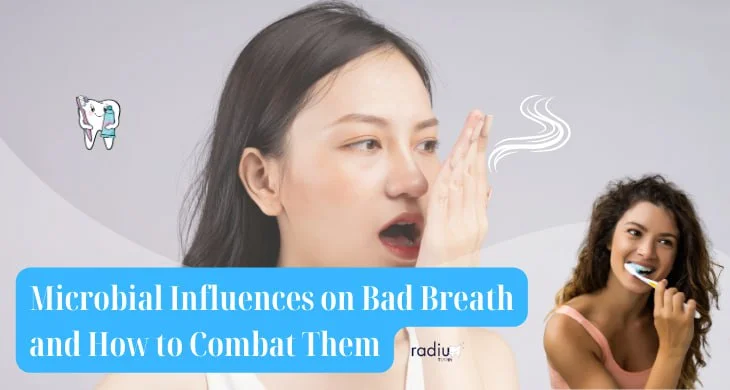Ever wondered why your breath sometimes smells not so pleasant? It’s not just about skipping brushing your teeth! Bad breath, also known as halitosis, can happen when certain bacteria in your mouth get out of balance. These tiny creatures are usually helpful, but when there are too many bad ones, they can make your breath stink. But don’t worry! There are ways to fix it. Understanding how these little guys cause bad breath and what we can do to stop them is super important for keeping our mouths fresh and healthy. So let’s dive in and learn how to keep our breath smelling sweet!
Understanding the Role of Oral Microbiome in Bad Breath
In our mouths, there’s a whole community of tiny creatures like bacteria, fungi, and viruses. Together, they make up what we call the oral microbiome. Now, this microbiome isn’t all bad; in fact, it helps keep our mouths healthy most of the time. But sometimes, things can get unbalanced. When there are too many of the bad guys and not enough of the good ones, it can lead to a problem called halitosis, which is just a fancy word for bad breath.
Picture this: Imagine your mouth is like a bustling city, and these microbes are the residents. Just like in any city, you’ve got good guys who help out and bad guys who cause trouble. Usually, there’s a balance, and everyone gets along fine. But when too many troublemakers start causing chaos, that’s when things start to smell funky.
Now, how does this happen? Well, it could be because of things like not brushing your teeth enough, eating foods that the bad guys love, or even just having a dry mouth. Whatever the reason, when the balance in your mouth gets disrupted, those bad microbes can produce smelly compounds that make your breath stink.
But don’t worry! There are ways to restore harmony in your oral city. By practicing good oral hygiene habits like brushing and flossing regularly, eating healthy foods, and staying hydrated, you can help keep those troublemakers in check and your breath smelling fresh. So remember, taking care of your oral microbiome is key to keeping bad breath at bay!
Types of Microbes Causing Bad Breath

Some bacteria in our mouths are real troublemakers when it comes to bad breath. They’re the ones that produce stinky stuff like hydrogen sulfide and methyl mercaptan, which make our breath smell not so nice. These bacteria really like places where there isn’t much oxygen, like in the gaps between our teeth or on the surface of our tongues.
Think of these bacteria as the villains in a story—they love to cause trouble! They hang out in those hard-to-reach spots in our mouths, munching on food particles and leftovers. As they digest these bits of food, they release those smelly compounds, kind of like letting off stink bombs in our mouths!
So, why do these bacteria thrive in places with low oxygen? Well, it turns out they’re anaerobic, which means they don’t need oxygen to survive. In fact, they prefer environments where oxygen levels are low because it suits their stinky business.
Now, you might be wondering how these bacteria end up in our mouths in the first place. Well, they’re actually pretty common—they’re found in lots of different places, like in the air we breathe, on the food we eat, and even on the things we touch. So, it’s no surprise that they find their way into our mouths and set up camp there.
But don’t worry, just because these bacteria like to cause trouble doesn’t mean we can’t fight back! By practicing good oral hygiene, like brushing and flossing regularly, and paying extra attention to those tricky spots where bacteria like to hide, we can keep them in check and keep our breath smelling fresh.
Factors Contributing to Microbial Imbalance
Poor Oral Hygiene
When we forget to take care of our teeth by brushing and flossing, bad bacteria start to pile up in our mouths. They team up with other yucky stuff and form plaque, which can make our gums sick and give us stinky breath. So, it’s super important to remember to brush and floss every day to keep those bad bacteria at bay and keep our mouths feeling fresh and clean!
Dry Mouth
Saliva is like our mouth’s superhero—it helps wash away the bits of food and fights off acids that can cause trouble. But when our mouth gets too dry, usually because of medicines we take or some health issues we have, it’s like giving a green light to stinky bacteria. They love it when our mouth is dry because they can party and make our breath smell not-so-great. So, staying hydrated and keeping our mouths moist is key to keeping those bacteria in check and our breath smelling fresh!
Diet and Lifestyle
Eating lots of sugary and starchy foods? Well, that’s like giving a party invitation to those stinky bacteria in our mouth. They love to munch on sugars and carbs and then release those smelly compounds that make our breath less than fresh. And if that’s not enough, habits like smoking and drinking too much alcohol can make things worse. They dry out our mouth, giving those bacteria even more space to spread and cause trouble. Thus, maintaining a clean breath can be achieved by controlling what we eat and drink, as well as by reducing our intake of alcohol and tobacco.
Combatting Microbial Causes of Bad Breath
Maintain Good Oral Hygiene
Making a habit of brushing and flossing every day is like giving those pesky bacteria a one-two punch! It helps get rid of food bits and that sticky stuff called plaque that bacteria love to feast on. By doing this, you’re stopping them from throwing a party in your mouth and making your breath smell funky. And if you want to go the extra mile, using a mouthwash that fights bacteria can give you even fresher breath. It’s like giving those microbes a swift kick and leaving your mouth feeling minty fresh! So, don’t forget to brush, floss, and rinse to keep your breath smelling as sweet as possible!
Stay Hydrated
Staying hydrated by drinking lots of water during the day is like giving your mouth a refreshing rinse. It helps wash away food crumbs and those pesky bacteria that can make your breath stinky. Plus, chewing on sugar-free gum or enjoying sugar-free candies can make your mouth feel all juicy and moist because they help your body produce more saliva. It’s like giving your mouth a little workout, but with a sweet twist! So, next time you’re feeling parched or want to freshen up your breath, grab a glass of water or pop in a piece of sugar-free gum.
Watch Your Diet
Cutting back on sugary and starchy snacks can make a big difference in keeping your breath fresh. These foods are like a buffet for those smelly bacteria, so by eating less of them, you’re giving those little critters less to munch on. Instead, load up on yummy fruits, veggies, and whole grains. Not only are they good for your overall health, but they also help keep your mouth happy and smelling nice. It’s like giving those bacteria a taste of healthy goodness instead of junk food! So next time you’re craving something sweet or carb-loaded, reach for a crunchy apple or some crunchy carrots instead.
Conclusion
Bad breath can be a real downer, but you don’t have to let those pesky microbes ruin your day. With some simple changes to your daily routine and lifestyle, you can kick bad breath to the curb and feel confident about your smile again. Just remember to brush and floss regularly, drink plenty of water, and watch what you eat. By keeping those bacteria in check and giving them less to feast on, you’ll be saying goodbye to bad breath in no time. So next time you’re feeling self-conscious about your breath, just remember that a few small tweaks to your routine can make a big difference. You’ve got this!
Frequently Asked Questions
Ques. Can mouthwash alone cure bad breath?
Ans. Mouthwash can help freshen breath temporarily, but it’s not a substitute for proper oral hygiene. Combining mouthwash use with brushing, flossing, and regular dental check-ups is essential for long-term odor control.
Ques. Are there any natural remedies for bad breath?
Ans. Some natural remedies, such as chewing on parsley, mint leaves, or cloves, can help temporarily mask bad breath. However, addressing the underlying cause, such as poor oral hygiene or dry mouth, is key to long-term freshness.
Ques. How often should I visit the dentist for bad breath concerns?
Ans. If you’re experiencing persistent bad breath despite maintaining good oral hygiene, it’s essential to consult a dentist.
Ques. Can certain medications cause bad breath?
Ans. Yes, some medications, particularly those that cause dry mouth as a side effect, can contribute to bad breath. If you suspect your medication is causing halitosis, discuss your concerns with your healthcare provider.
Ques. Are there any changes that can help prevent bad breath?
Ans. Maintaining a healthy lifestyle, including staying hydrated, eating a balanced diet, avoiding tobacco products, and practicing good oral hygiene, can significantly reduce the risk of bad breath and promote overall oral health.

